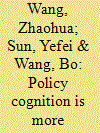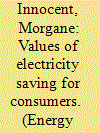|
|
|
Sort Order |
|
|
|
Items / Page
|
|
|
|
|
|
|
| Srl | Item |
| 1 |
ID:
085432


|
|
|
|
|
| Publication |
2008.
|
| Summary/Abstract |
In spite of the efforts to safeguard consumers' health through product regulations, reports revealed that diseases and illnesses due to unhygienic production and consumption are on the increase. This study examined knowledge of consumers about information and warning labels on selected products in Ado Ekiti in southwestern Nigeria. Findings from the study revealed that respondents had average knowledge of information labels on the selected products. Also, a majority of the respondents did not check information on products before purchase and consumption. Chi-square results further showed relationships among some variables tested. The article recommends ways by which higher knowledge could be achieved.
|
|
|
|
|
|
|
|
|
|
|
|
|
|
|
|
| 2 |
ID:
118232


|
|
|
|
|
| Publication |
2012.
|
| Summary/Abstract |
The financial crisis which began in 2007 has been widely interpreted as a crisis of neoliberalism, akin to the crisis of Keynesianism of the 1970s. But there is little sign of a major paradigmatic alternative, either in theory or in practice. This article looks at how the crises and failures of neoliberalism are occurring at a micro-policy level, where they are interpreted in terms of the fallibility of individual rational choice. Policy responses to this crisis, drawing on more psychologically nuanced accounts of economic behaviour, can be described as 'neocommunitarian', inasmuch as they echo the communitarian critique of the liberal self. Where neoliberalism rests on a vision of the individual as atomised and rational, neocommunitarianism treats individuals as governed by social norms and incentives simultaneously. And where neoliberalism subjects individuals to periodic audit organised around targets and outputs, neocommunitarianism conducts a constant audit of behavioural fluctuations in real time.
|
|
|
|
|
|
|
|
|
|
|
|
|
|
|
|
| 3 |
ID:
116940


|
|
|
|
|
| Publication |
2012.
|
| Summary/Abstract |
Commitment to increase public awareness of climate change mitigation has risen substantially and so has the appreciation of the impact that comes from voluntary behaviour change. We aimed to test whether a process could be designed that encouraged individuals - from within their existing social networks - to facilitate energy reduction discussions that ultimately changed the way they consumed energy. Our "Energymark" process was grounded in the idea that change is facilitated by several supporting factors including the provision of tailored information, social support, encouragement to set goals, and access to feedback. In this paper we report on the first trial with members of the Australian public. By the end of the trial an average emissions reduction of 20% was reported using a pre- and post-trial carbon calculator incorporating the energy used at home, waste, spending on products and services, beef consumption, and transport. While many identified as climate change aware, and had the socio-economic capacity to make changes, we found that participants of widely varying demographics and dispositions responded to program features, achieving equivalent emissions reductions. This bodes well for the program's effectiveness and warrants further testing of the impact of voluntary action with social processes such as Energymark.
|
|
|
|
|
|
|
|
|
|
|
|
|
|
|
|
| 4 |
ID:
084285


|
|
|
| 5 |
ID:
112310


|
|
|
|
|
| Publication |
2012.
|
| Summary/Abstract |
Considering household appliance automation for reduction of household peak power demand, this study explored aspects of the interaction between household automation technology and human behaviour. Given a programmable household appliance switching system, and user-reported appliance use times, we simulated the load reduction effectiveness of three types of algorithms, which were applied at both the single household level and across all 30 households. All three algorithms effected significant load reductions, while the least-to-highest potential user inconvenience ranking was: coordinating the timing of frequent intermittent loads (algorithm 2); moving period-of-day time-flexible loads to off-peak times (algorithm 1); and applying short-term time delays to avoid high peaks (algorithm 3) (least accommodating). Peak reduction was facilitated by load interruptibility, time of use flexibility and the willingness of users to forgo impulsive appliance use. We conclude that a general factor determining the ability to shift the load due to a particular appliance is the time-buffering between the service delivered and the power demand of an appliance. Time-buffering can be 'technologically inherent', due to human habits, or realised by managing user expectations. There are implications for the design of appliances and home automation systems.
|
|
|
|
|
|
|
|
|
|
|
|
|
|
|
|
| 6 |
ID:
176678


|
|
|
|
|
| Summary/Abstract |
As a demand response plan, the step tariff policy for electricity has been fully implemented for several years in China. However, it is not clear whether the step tariff policy for electricity is effective. Therefore, we analysed and compared the effectiveness of step tariff policy from two aspects: step tariff and policy cognition. Specifically, combining macro-scale statistical data and microscopic research data, we constructed a regression discontinuity design and binary response model. First, we tested the correction effect of the step tariff to residential electricity consumption behaviour. Further, combined with cognitive behavioural theory, we analysed the role of policy cognition in the occurrence of electricity saving behaviour. Finally, based on the cognitive evaluation theory, the impact of residents’ heterogeneity on their cognitive differences was identified. The specific conclusions are as follows: (1) The step tariff based on the Ramsay strategy cannot effectively correct electricity consumption behaviours as expected. (2) Compared with the step tariff, construction of correct policy cognition has a more significant effect on changing the customary behaviour of electricity consumption. (3) Policy cognition of residents is heterogeneous, and groups with weak policy cognition are accurately identified.
|
|
|
|
|
|
|
|
|
|
|
|
|
|
|
|
| 7 |
ID:
168301


|
|
|
|
|
| Summary/Abstract |
By 2020, every UK household has the option to have a Smart Energy Monitor (SEM) installed, displaying electricity consumption monetarily. The success of the £11 billion scheme in enabling people to reduce energy consumption is questioned amongst researchers and relatively little is known about older adults' (60 + years) responses to SEMs. This paper explores older adult responses to SEM feedback and compares them to those of younger-middle aged adults (25–59 years). A qualitative, interpretative methodology was used with participants from 20 households recording their SEM experiences during one month through a diary, and post-study semi-structured interview allowing methodological triangulation. Data analysis indicated that older adults were generally more aware of their energy use pre-SEM and practiced energy saving behaviours learnt from upbringing. This appeared to result in negligible positive benefits and low engagement with the device. Other limiting factors included lack of technical skills and confidence, and the risk of losing the comfort and convenience of using electrical appliances. The device also triggered negative emotions and depression amongst some older adults surrounding electricity usage, potentially leading to dangerously cold homes. Consequently, the scheme's appropriateness is questioned, especially for older adults, and improvements are suggested for SEMs and the scheme.
|
|
|
|
|
|
|
|
|
|
|
|
|
|
|
|
| 8 |
ID:
111379


|
|
|
|
|
| Publication |
2012.
|
| Summary/Abstract |
Social scientists from all areas are developing theories and testing practical approaches to change individuals' actions to lower greenhouse gas emissions. In the UK context, policy-makers, local authorities, companies and organisations are using these theories to invest resources to change individual's actions. The problem is that social scientists are delivering fragmented science based on narrow disciplinary views and those using this science are cherry picking whatever theory suits their agenda. We argue that with substantial GHG emission reduction targets to be achieved, a multidisciplinary application and view of social science are urgently needed.
|
|
|
|
|
|
|
|
|
|
|
|
|
|
|
|
| 9 |
ID:
187988


|
|
|
|
|
| Summary/Abstract |
The reproductive healthcare system is meagre in the ethnic communities of Bangladesh. Notwithstanding the availability of studies on the healthcare-seeking behaviour of ethnic groups in Bangladesh, studies explicitly focused on the social networks of ethnic women, and their likely influences on reproductive health in this context are rare. We analyse how social networks impact ethnic women’s reproductive healthcare-seeking behaviour in Bangladesh. A total of 205 married ethnic—Garo and Mandai—women were selected purposively from Madhupur Upazila in the Tangail district. Data were collected through face-to-face interviews using a structured interview schedule. Descriptive statistics show that the average score of reproductive healthcare-seeking behaviour of Garo and Mandai women is low (40 out of 70), and the average network size of that women is slightly small (2.58). Results from hierarchical multiple regression models show that, next to years of schooling, reproductive health-related training and membership status, network size is positively related, while reproductive health constraints are negatively related, and ethnicity is not statistically associated with reproductive healthcare-seeking behaviour of Garo and Mandai women. This study reveals that social networks of ethnic women may improve their reproductive healthcare-seeking behaviour in Bangladesh. Hence, the policy recommendation is that social network agents are more equipped with reproductive health-related knowledge and information.
|
|
|
|
|
|
|
|
|
|
|
|
|
|
|
|
| 10 |
ID:
177478


|
|
|
|
|
| Summary/Abstract |
Electricity markets are complex; they involve long lead-times, include feedbacks that are generally hard to interpret and are influenced by environmental concerns and political objectives. After liberalization, the markets moved from a monopoly situation with a single service provider and captive customers to competitive markets with multiple service providers. Foreseeing the consequences of regulatory decisions is thus becoming increasingly complicated for the regulator. However, understanding these is central to avoid mismatches between the markets and their regulation, which could result in unanticipated and costly long-term consequences.
|
|
|
|
|
|
|
|
|
|
|
|
|
|
|
|
| 11 |
ID:
162300


|
|
|
|
|
| Summary/Abstract |
This study aims at understanding the perceived value to consumers of practicing electricity saving. Based on an exploratory qualitative investigation and on two quantitative surveys, our study seeks to identify the values of electricity saving and model their relation with the intensity of electricity-saving behaviours. The results point to seven components of positive or negative assessments linked to the practice of electricity saving. These can be described in terms of environmental and citizen aspects, household management, feelings of well-being, secondary benefits, daily efforts, social consequences and lack of knowledge. Our results suggest that the main value lever of electricity-saving for consumers is more closely linked to well-being rather than environmental or money-saving concerns. These findings lead us to formulate new recommendations for public authorities to support their efforts in reducing residential electricity consumption.
|
|
|
|
|
|
|
|
|
|
|
|
|
|
|
|
| 12 |
ID:
177129


|
|
|
|
|
| Summary/Abstract |
The tools available to translate climate targets into abatement actions are mainly based on costs and technical feasibility. Options for greenhouse gas abatement span all sectors, all countries, and involve a huge variety of technologies. The reasons for abatement to be realized, or not, are diverse and complex. In particular, the political discussion why many affordable options do not materialize is naïve and ad hoc. Here we show the Y factor, an approach for a quick scan of abatement options against a set of prominent abatement barriers. We define 12 factors which capture a broad set of barriers related to 1) costs and financing, 2) multi-actor complexity, 3) physical interdependencies and 4) behaviour. We rank 24 abatement options using an explicit, but coarse scoring for these barriers. We show that all abatement options have implementation barriers, many of which may well drastically impact their implementation beyond what would be expected from their abatement costs. The analysis implies that the relation between abatement costs and the barriers withholding implementation is not straightforward and calls for a deliberate policy debate on prioritization and policy intervention. The Y factor structures such a policy debate.
|
|
|
|
|
|
|
|
|
|
|
|
|
|
|
|
|
|
|
|
|